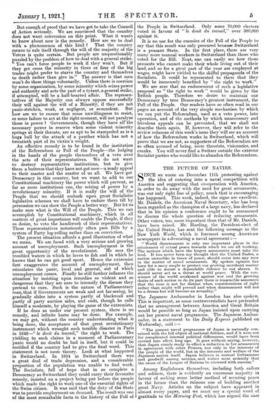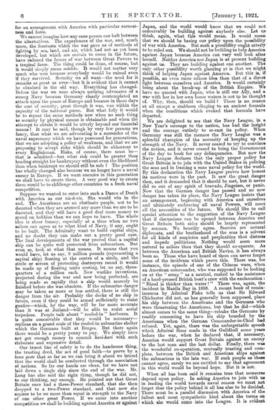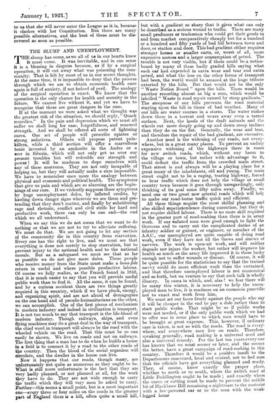THE FUTURE OF NAVIES.
SINCE we wrote on December 11th protesting against the idea of entering into a naval competition with America and suggesting that co-operation with America, in order to do away with the need for great armaments, was our only right line of policy, much that is encouraging has happened. This week, indeed, the signs are excellent. Mr. Daniels, the American Naval Secretary, who has long been regarded as the champion of a large navy, has declared that in his opinion a conference ought to be summoned to discuss the whole question of reducing armaments. Other voices, too, more important than that of Mr. Daniels, have been raised. Mr. Harding, the President-elect of the United States, has sent the following message to the New York World, which is foremost among American newspapers in advocating a naval agreement :- "World disarmament is only one important phase in the attainment of actual peace towards which we are all working. The nations which have the largest armaments must take the lead. It has never been my thought that the United States, a nation unwarlike in times of peace, should enter into any race in the matter of naval armaments. My spoken opinion has been for a navy ample to protect our growing merchant marine and able to assure a dependable defence to our shores. It should never act as a threat at world peace. With the con- science of the world awakened against war and the growing desire of each nation to do its part there is reasonable assurance that the time is not far distant when considerations of right rather than might will prevail and when disarmament will not be a dream but will become an actuality."
The Japanese Ambassador in London has also spoken. This is important, as some controversialists have pretended that no arrangement between America and Great Britain would be possible so long as Japan insisted upon carrying out her present naval programme. The Japanese Ambas- sador, in a statement to the Daily Express published on Wednesday, said :- " The present naval programme of Japan is naturally con- ceived with the full object of national defence, and if it were not for complicated internal political differences, would have been carried into effect long ago. It goes without saying, however,. that Japan stands ready to effect a reduction in her armaments in agreement with other Powers, not only in the interests of the people of the world, but in the interests and welfare of the Japanese nation itself. Japan believes in mutual forbearance and goodwill among nations, and wishes most ardently that the cause of the League of Nations be crowned with success."
Among Englishmen themselves, including both sailors and soldiers, there is evidently an enormous majority in favour of seeking some better method of securing peace in the future than the ruinous one of building another great Navy. Articles on the subject have appeared in almost every paper, and we must say a special word of gratitude to the Morning Post, which has argued the case every En man. Risks, of course, there must be— that is a isttecl—but what risk could be greater than heading straight for bankruptcy without even the likelihood than when bankrupt we should still be safe ? The position competition. did so out of any spirit of bravado, Jingoism, or panic. Suppose we wanted to enter into such a Dance of Death Now that the German danger has passed and no new with America as our vis-a-vis. She would win in the danger has taken its place, the Navy League insists that end. The Americans are an obstinate people, not to be an arrangement, beginning with America and ourselves meet daunted when they are aroused any more than we are to be and ultimately embracing all naval Powers, will daunted, and they will have a good deal more money to all the necessities of the future. We should like to call spend on hobbies than we can hope to have. The whole special attention to the suggestion of the Navy League idea is sheer lunacy, especially at a time when no two that if discussions can be opened between America and sailors can agree as to what kind of Navy, if any, ought Great Britain both sides should be largely represented to be built. The Admiralty want • to build capital ships, by seamen. We heartily agree. Seamen are natural and no doubt they can make out a pretty good case. diplomats, and the brotherhood of the seas is a solvent for all kinds of suspicion and perplexities that distress The final developments of the war proved that a capital ship can be quite well protected from submarines. But and impede politicians. Nothing would seem more even so, look at what that means. It means that you natural to sailors than that they should co-operate. As would have, let us say, 9 million pounds (representing a ri capital ship) floating at the centre of a circle, and the been so. Those who have heard of them can never forget circle or screen of protecting destroyers round it would some of the incidents which prove this. There was, for be made up of floating units costing, let us say, three- instance, the episode of one of the Chinese wars, when quarters of a million each. New warlike inventions an American commander, who was supposed to be looking projected during the war and now being perfected, are , on at the " scrap " as a neutral, rushed to the assistance being made so rapidly that a ship would scarcely be of a hard-pressed British boat's crew with the exclamation : "" finished before she was obsolete. If the submarine danger Blood is thicker than water ! There was, again, the incident in Manila Bay in 1898. A recent book of remin- may be taken as more or less settled, there is still the iscences by Admiral Fiske tells us that Sir Edward danger from the air. Probably the decks of no ship in Chichester did not, as has generally been supposed, place future, even if they could be armed sufficiently to resist his ship between the Americans and the Germans who gunfire—which, by the way, will be far more accurate were threatening the Americans, but that he did—which than it was at Jutland—will be able to resist aerial torpedoes. People talk about " roofed-in " harbours. It almost comes to the same thing—rebuke the Germans by is quite conceivable that they would be necessary— readily consenting to have his ship boarded by the replicas on a grand scale of the roofed-in submarine shelter Americans when the German Commander-in-Chief had which the Germans built at Bruges. But there again refused. Yet, again, there was the unforgettable speech some years there would be a pretty penny to pay. We simply have which Admiral Sims made in the Guildhall not got enough money to commit hari-kari with such before the war, when he declared that, if necessary, elaborate and expensive detail. America would support Great Britain against an enemy Our truest line of safety is to do the handsome thing, to the last man and the last dollar. Finally, there was a the trusting deed, the act of good faith—to prove by the wonderful co-operation, mutually trusting and com- beau geste that so far as we can bring it about we intend plete, between the British and American ships against that the world shall be conducted through the association the submarines in the late war. If such people as these of nations. So far our hands are clean, for we have not cannot agree, surely we are entitled to say that agreement laid down a single ship since the end of the war. Mr. in this world would be beyond hope. But it is not. Long has also said the right thing, though he did not, When all has been said it remains true that measures to our thinking, say enough. He pointed out that Great depend upon policy. In asking America to join with us Britain once had a three-Power standard, that she then in leading the world towards naval reason we must not dropped to a two-Power standard, and that now she forget that the policy behind it all has also to be decided. aspires to be no more than equal in strength to the Navy There must be a parallel discussion with America of the of one other great Power. If we enter into another fullest and most sympathetic kind about the terms on competition we shall be building against America or against which she would come into the League. It is evident for an arrangement with America with particular earnest- Japan, and the world would know that we could nob new) and force. conceivably be building against anybody else. Let 118 We cannot imagine how any sane person can halt between think, again, what t would mean. It would mean the alternatives. The experiences of the war, and, much that we should be basing our policy upon the possibility more, the foretaste which the war gave us of methods of of war with America. But such a possibility out utterly fighting by sea, land, and air, which had not as yet been to be ruled out. We should not be building to help America developed, but which are certain to come in the future, against Japan because America can very well look after have reduced the future of war between Great Powers to herself. Neither America nor Japan is at present building tragical farce. The thing could be done, of course, but against us. They are building against one another. The it would simply mean suicide. It would not matter very only other possibility worth glanoing at is that we might much who won because everybody would be ruined even think of helping Japan against America. But this is, if if they survived. Security we all want—the need for it possible, an even more odious idea than that of a direot remains as great as ever—but it is evident that it cannot fight between ourselves and America. It would certainly be obtained in the old way. Everything has changed. bring about the break-up of the British Empire. We Before the war we were always untiring advocates of a have no quarrel with Japan, who is still our Ally, and a strong Navy because Germany clearly contemplated an war with her in her own home waters is not to be thought attack upon the peace of Europe and because in those days of. Why, then, should we build ? There is no reason the cost of security, great though it was, was within the at all except a stubborn clinging to an ancient formula capacity of the national purse. But what folly it would when the conditions which evoked that formula have be to repeat the same methods now when no such thing departed. ea security by physical means is obtainable and when the We are delighted to see that the Navy League, in a attempt to obtain it would be utterly beyond our financial New year's message to the nation, has had the insight means 1 It may be said, though by very few persons we and the courage entirely to re-cast its polioy. When fancy, that what we are advocating is a surrender of the Germany was still the menace the Navy League was a naval supremacy which we have possessed for generations, splendid champion of the necessity of keeping up the that we are adopting a policy of weakness, and that we are strength of the Navy. It never ceased to try to convince proposing to accept risks which should beabhorrent to the nation, and it never ceased to bring the Government of the day to book for any delinquencies. But now the Navy League declares that the only proper policy for Great Britain is to join with the United States in policing t has wholly changed also because we no longer have a naval the seas and in framing a sane naval policy for the world. enemy in Europe. If we want enemies in this generation By this declaration the Navy League proves how honest its motives were in the past. It saw the great danger we shall have to create them. A very good way to create them would be to ch&llenge other countries to a fresh naval then, and it demanded that it should be met, but it never competition. did so out of any spirit of bravado, Jingoism, or panic. Suppose we wanted to enter into such a Dance of Death Now that the German danger has passed and no new with America as our vis-a-vis. She would win in the danger has taken its place, the Navy League insists that end. The Americans are an obstinate people, not to be an arrangement, beginning with America and ourselves meet daunted when they are aroused any more than we are to be and ultimately embracing all naval Powers, will daunted, and they will have a good deal more money to all the necessities of the future. We should like to call spend on hobbies than we can hope to have. The whole special attention to the suggestion of the Navy League idea is sheer lunacy, especially at a time when no two that if discussions can be opened between America and sailors can agree as to what kind of Navy, if any, ought Great Britain both sides should be largely represented to be built. The Admiralty want • to build capital ships, by seamen. We heartily agree. Seamen are natural and no doubt they can make out a pretty good case. diplomats, and the brotherhood of the seas is a solvent for all kinds of suspicion and perplexities that distress The final developments of the war proved that a capital ship can be quite well protected from submarines. But and impede politicians. Nothing would seem more even so, look at what that means. It means that you natural to sailors than that they should co-operate. As between the American and British Navies, it has always capital ship) floating at the centre of a circle, and the been so. Those who have heard of them can never forget circle or screen of protecting destroyers round it would some of the incidents which prove this. There was, for be made up of floating units costing, let us say, three- instance, the episode of one of the Chinese wars, when quarters of a million each. New warlike inventions an American commander, who was supposed to be looking projected during the war and now being perfected, are , on at the " scrap " as a neutral, rushed to the assistance being made so rapidly that a ship would scarcely be of a hard-pressed British boat's crew with the exclamation : "" finished before she was obsolete. If the submarine danger Blood is thicker than water ! There was, again, the incident in Manila Bay in 1898. A recent book of remin- may be taken as more or less settled, there is still the iscences by Admiral Fiske tells us that Sir Edward danger from the air. Probably the decks of no ship in to us that she will never enter the League as it is, because it clashes with her Constitution. But there are many possible alternatives, and the best of these must be dis- covered as soon as possible.












































 Previous page
Previous page